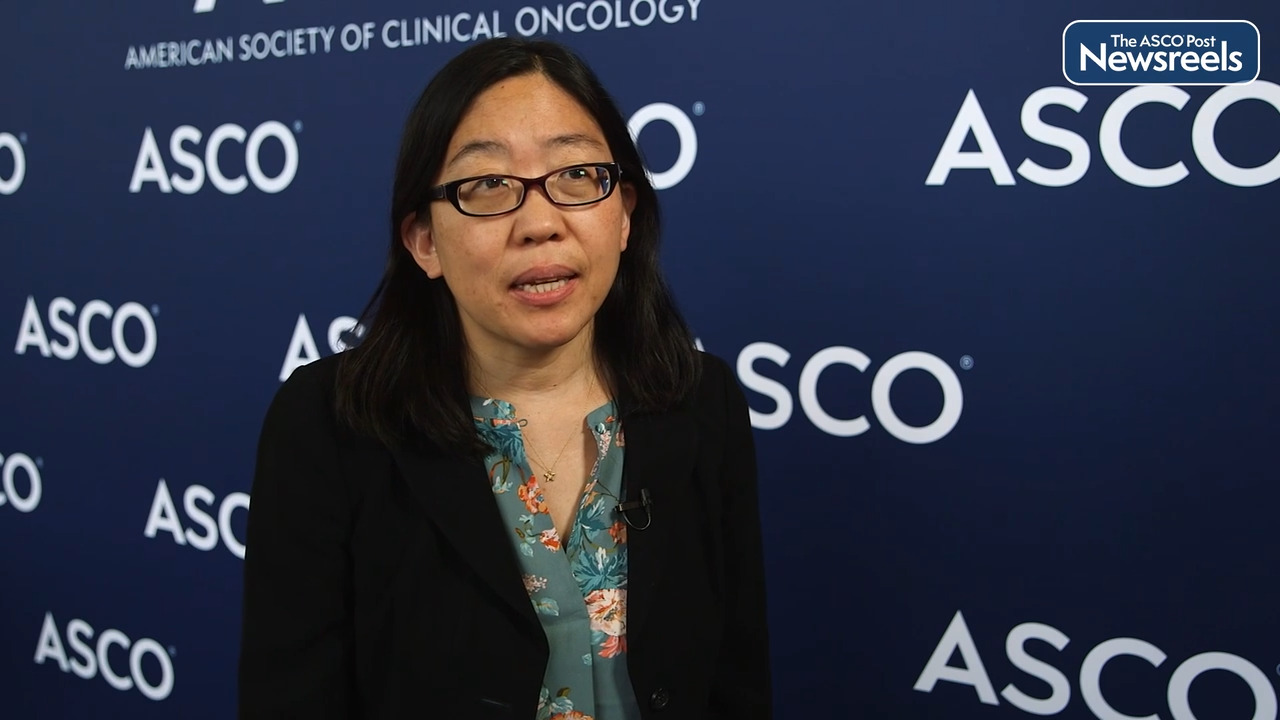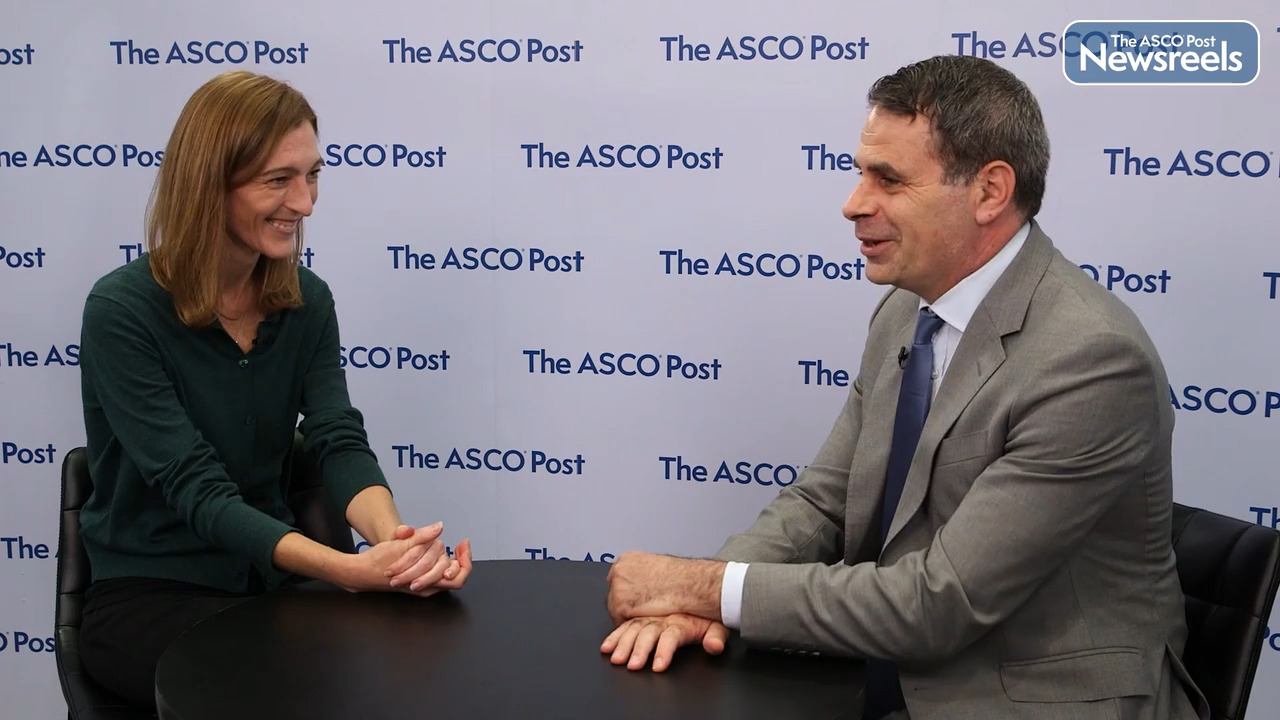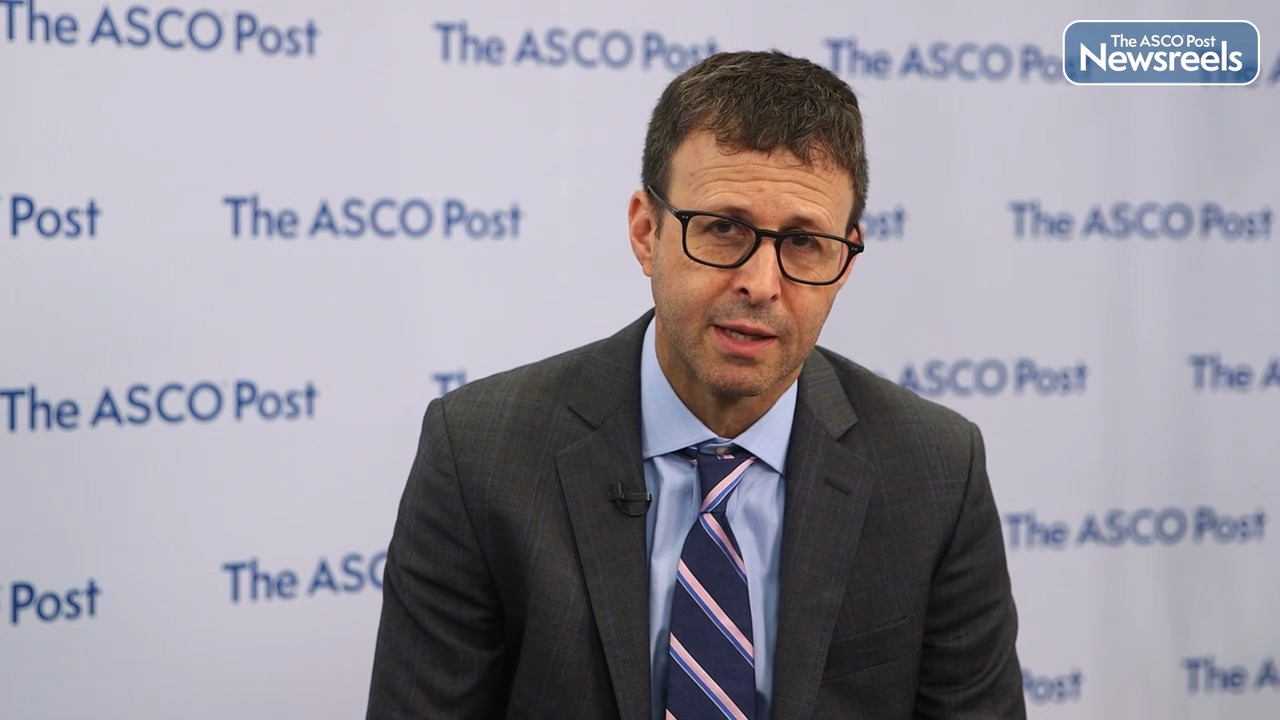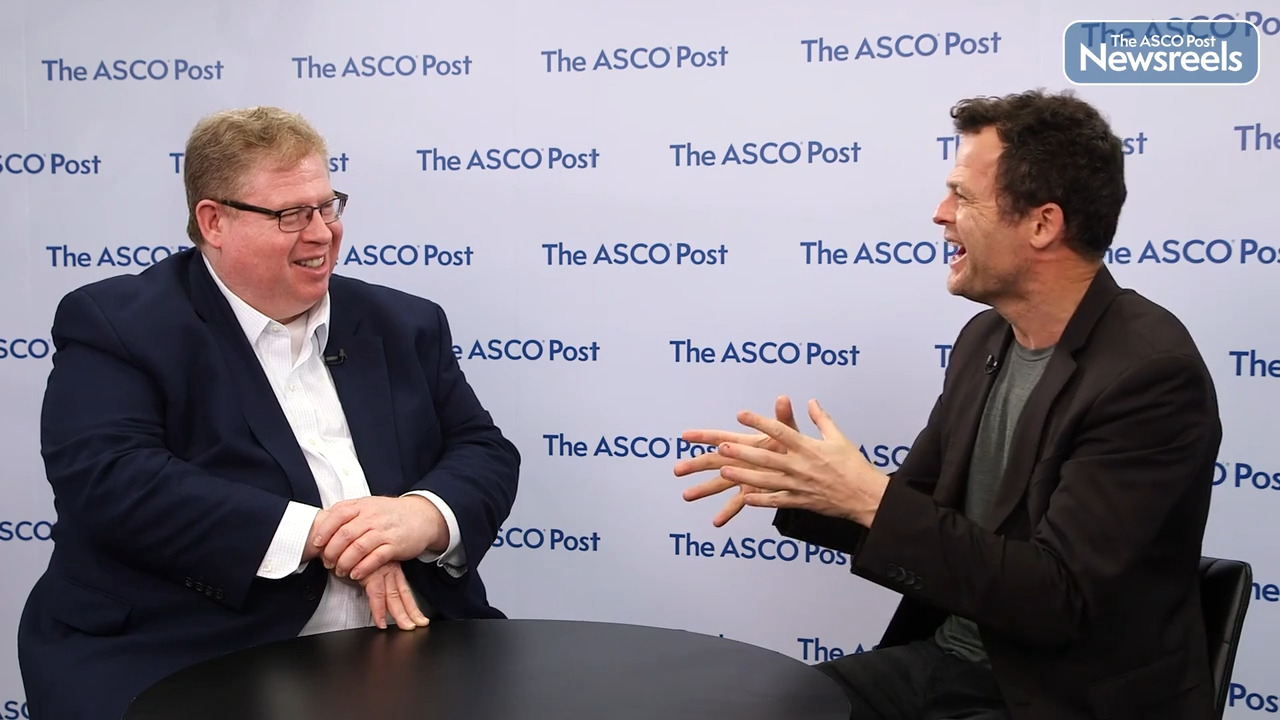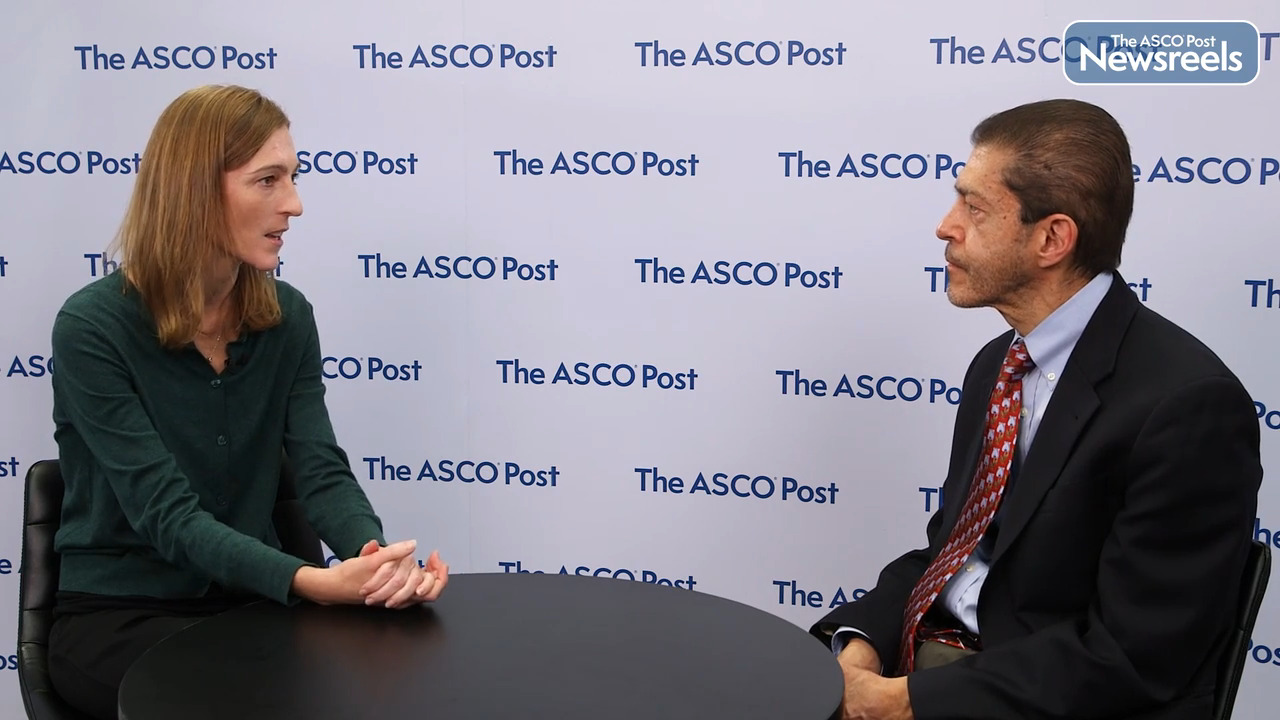Transcript
Disclaimer: This video transcript has not been proofread or edited and may contain errors.
Alicia Morgans: Michael, it's great to talk with you today. I really wanted to hear your thoughts on these updates around therapy and really kind of dig into that data.
Michael Hofman: Thanks Alicia, it's always good to have the opportunity to present our data. Therapy was a clinician led study run by the ends up cancer trials group in Australia. And it was the first randomized control trial of lutetium PSMA 617, randomizing to either lutetium or cabazitaxel chemotherapy. And we now have three year mature follow up, which is really nice long-term data.
Alicia Morgans: It is and I think we've already seen some of the data before demonstrating differences between cabazitaxel and lutetium in terms of PSA response, with a greater PSA response in those patients receiving lutetium. Other outcomes have been reported before too I mean, including quality of life.
Michael Hofman: Yeah, so in our Lancet publication last year, we summarized the key primary and secondary endpoint. The PSA 50% response rate was double with lutetium compared to cabazitaxel as was the RECIST CT response rate. So it wasn't just PSA, but tumorous shrinkage on imaging was twice as much. And that also related to a delayed in progression, either radiographic or PSA. By 12 months almost everyone in the cabazitaxel arm had progressed. Only 3% had not progressed, whereas 19% in the lutetium PSA and a 617 arm had not progressed. There was a big difference at that 12 month landmark time point.
Alicia Morgans: Well, and importantly, you most recently reported survival data, which I think we've all been waiting for even though, of course, this was not the primary end point. Can you remind me of what you found?
Michael Hofman: Yeah, it was only a 200 patient study and it was never powered for overall survival. And we did not see a significant difference in survival between cabazitaxel and lutetium PSMA 617, but we need to put it into the context of what happened post randomization and what happened post protocol. After randomization 15 men in the cabazitaxel arm withdrew their consent. These were men who wanted to access lutetium PSMA 617, so when they were randomized to the wrong arm they withdrew their consent. And many of them accessed lutetium PSMA off trial in Australia, and we did an intention to treat analysis so those patients are analyzed as if they had cabazitaxel and then post protocol, post cabazitaxel men were able to access lutetium PSMA and around 20% of men did, and vice versa people in the lutetium arm got cabazitaxel and around 30% did. It was really kind of a trial of what's the additional benefit of adding lutetium PSMA into the mix. And I think what we see with the survival numbers take into account all those post protocol treatments and the dropouts in the cabazitaxel arm.
Alicia Morgans: And I think that you make such great points when we think about survival data, especially in prostate cancer where we have so many options that we can use, thankfully, to sequence around these different options that you used in the trial. I think it's not unexpected that we see that other therapies come into play and patients end up having very similar survivals because they're ultimately getting similar agents just in a bit of a different order. And to your point, there were patients who dropped out at the very beginning and then went straight on to lutetium potentially because they withdrew.
Michael Hofman: Correct. It reminds us that cabazitaxel is a very active treatment. And we chose that as the active comparator, which is quite different than the vision trial, which had maybe a suboptimal sort of control arm. But it also, the question at the end of therapy is do you use lutetium PSMA before or after cabazitaxel? And I think the trial answer from our point of view is fairly clear because it's not just about survival, but it's about quality of life and lutetium PSMA 617 it's really a lot better tolerated. The grade three to four toxicities are much less and patient reported outcomes much better with lutetium PSMA. It's a little bit like docetaxel compared to enzalutamide or abiraterone in that castration sensitive space. We have a new treatment really improves the quality of life of men compared to chemotherapy, but it doesn't mean that you're not going to use chemotherapy. You still keep cabazitaxel up your sleeve, and when you progress after Lutetium you really need to seriously consider whether that remains a suitable treatment option.
Alicia Morgans: Well, one of the things I think was most important and distinct about therapy is that this was not an all comers trial, and we should make sure to mention that this was a trial where we really selected patients based on an FDG pet and a PSMA pet. And this was a subgroup of patients that had optimized the PSMA expression actually really to be included in the trial. And I'd love to hear your thoughts on that specific issue because from an all commerce population in our clinical practice, there very well may be patients who are much better suited for cabazitaxel, given the fact that they're low expressing in terms of PSMA or have high FDG pet expression and lower relative PSMA pet expression.
Michael Hofman: Yeah. So in the vision trial around 90% of men were suitable after PSMA pet and in the therapy trial around 70% of men were suitable after PSMA and FDG. We were a little bit tighter in our patient selection in part that was because it was a phase two trial. We wanted to enrich it for patients that were really most likely to respond, but it's clear in both the vision trial and the therapy trial that all those men did better than the alternative arm. And this really is a suitable treatment for the majority of men with metastatic castration-resistant prostate cancer. Both trials were post docetaxel, post Abi/enza. So is in that sort of third line setting. That's important to remember, but we did select out 30% of patients. And we also reported on the outcomes of those men and their survival was around 11 months compared to more like 19 months for the men that were randomized. These are men that do particularly worse, probably no matter what treatment they get and we didn't treat them with lutetium. We actually don't know whether some of those patients that would've gone into the vision trial and been suitable that we excluded out, whether they would still benefit from lutetium PSMA.
Alicia Morgans: That's really such a great way to think about it. And the one final thing that I'd love to hear about in all the other things that we still have to learn about the use of lutetium is, how we can select patients potentially or prognosticate predict patients to response. And you had some really interesting data that you presented recently on use of PSMA pet as a predictive biomarker. I'd love to hear your thoughts on that.
Michael Hofman: Yeah, it's a really interesting area. Since we are selecting men with a PSMA pet CT, we can put a contour over all of the tumor and then get the average intensity of PSMA uptake, which is the SUV mean. Now this is a software tool that's not really widely available at the moment. You're probably, I'm guessing, don't get it on the pet CT reports that you are receiving back. And it does require some manual work and it's not completely standardized at the moment. Perhaps it's still in the research domain, but in an expert tertiary center like ours and a sub-analysis of the vision trial, where this has been performed. The SUV mean is a really powerful prognostic and predictive biomarker. So there's a group of men with very high PSMA expression. They're kind of the top 30% of PSMA expresses in the therapy trial and the vision trial, and they do particularly well. We see really the extraordinary responses. They're often very deep. Sometimes we're seeing PSA responses as much as 99% and the durability can be quite remarkable. And often these men are suitable for re-treatment. They just have a phenotype with really high PSMA expression. I think it is a bit of a research question at the moment, since these tools are not widely available and there needs to be some more standardization across centers, but I think it is a really promising biomarker for the future. And we might be really, if you see that super high PSMA expression, say really we need to get you lutetium PSMA therapy very quickly.
Alicia Morgans: Great. Anyway, I think, to help us make these decisions in clinic is welcome and we are all eager to see that come to the floor in the future. I really appreciate your expertise today.
Michael Hofman: Thanks so much Alicia
